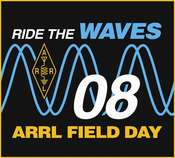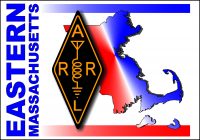Field Day Page!
 The June, 2008 EMa Field Day was a great success. You can check out all the Field Day activities that occurred and what local Amateur Radio Clubs participated on the Section Field Day page. Thanks to a tremendous amount of effort and hard work by Bill Ricker, N1VUX, the Field Day page is a wonderful compendium of every resource one could want: directories of all clubs and groups operating in the section, including past scores, maps, locations (GPS coordinates, too!) and contact numbers. Also included is a full description of the Field Day rules. Be sure to check this out!
The June, 2008 EMa Field Day was a great success. You can check out all the Field Day activities that occurred and what local Amateur Radio Clubs participated on the Section Field Day page. Thanks to a tremendous amount of effort and hard work by Bill Ricker, N1VUX, the Field Day page is a wonderful compendium of every resource one could want: directories of all clubs and groups operating in the section, including past scores, maps, locations (GPS coordinates, too!) and contact numbers. Also included is a full description of the Field Day rules. Be sure to check this out!
Background and Information
Current and past field day information appears in this area. You can view the rules (w/o forms) at http://www.arrl.org/contests/forms/index.html#FD
Field Day Weather & Safety Tips
[Article contributed by our SKYWARN Coordinator, Rob, KD1CY] Field Day can bring various extremes of weather. From thunderstorms, flooding and severe weather to extreme heat, part of the exercise of Field Day is to be prepared for these weather elements. Bill Ricker-N1VUX and Rob Macedo-KD1CY have provided a plethora of safety tip information for the varying extremes of weather that can occur on a Field Day weekend. Please see the Field Day Safety Information page for more information.
Field Day can bring various extremes of weather. From thunderstorms, flooding and severe weather to extreme heat, part of the exercise of Field Day is to be prepared for these weather elements. Bill Ricker-N1VUX and Rob Macedo-KD1CY have provided a plethora of safety tip information for the varying extremes of weather that can occur on a Field Day weekend. Please see the Field Day Safety Information page for more information.
FIELD DAY GETS A NEW ENTRY CLASS FOR 2003
Field Day will gain another entry class for the 2003 running of this highly popular operating event June 28-29. “Class F” stations will operate at emergency operations centers–or EOCs. The change renews the emphasis of Field Day’s 1933 origins as an emergency preparedness exercise as opposed to a routine contest–what former ARRL Communications Manager F. E. Handy, W1BDI, called “a test of the emergency availability of portable stations and equipment.” In Handy’s view, Field Day would focus attention “on the subject of ‘preparedness’ for communications emergencies.”
ARRL Contest Branch Manager Dan Henderson, N1ND, says the League last year received a record 2110 Field Day entries from groups and individuals. That represented a total of almost 35,000 participants who joined in what Henderson called “a great tradition.” Given the increased emphasis on emergency communications since September 11, 2001, Henderson says, the ARRL Board’s Membership Services Committee asked that the Contest Branch come up with a way to accommodate stations wanting to operate from the local EOC. The new Class F station, operating from an EOC, is the result.
“This is a major change,” Henderson said. “Class F has been established to encourage groups to test and further their working relationships with established emergency operations centers.” The updated rules and a list of frequently asked questions in the new 2003 Field Day Packet spell out the details.
A Class F entry station must set up at an “established EOC” activated by a club or non-club group. An EOC is defined as a facility established by a federal, state, county, city or other civil governmental agency or administrative entity or by a chapter of a national or international served agency. The latter could include the American Red Cross or The Salvation Army, with which the Field Day group “has an established operating arrangement.” Class F EOC operation must take place in cooperation with the EOC staff. Class F stations are eligible for the same bonus points as Class A stations.
There’s also been what Henderson called “some tweaking” in the rules for Field Day 2003. Among the highlights, the rules reduce from 400 to 100 the number of QSOs that the “Get On The Air” (GOTA) station needs to make to claim a 100-point bonus. “GOTA stations still may work up to a maximum of 400 QSOs to go towards the main station’s score,” Henderson said.
In addition, the 2003 rules enhance the bonus for having an invited official visit the Field Day site. There are now two separate bonus categories–100 points for the elected official and another 100 points for a visit by a representative of a served agency.
Henderson reminds Field Day participants that stations do not get additional bonus points for contacting stations through additional satellites. As of the 2002 event, Field Day opened up to stations throughout the Americas, not just in the US and Canada. Henderson encourages participants to post their Field Day experiences and photographs to the Field Day Online soapbox.

